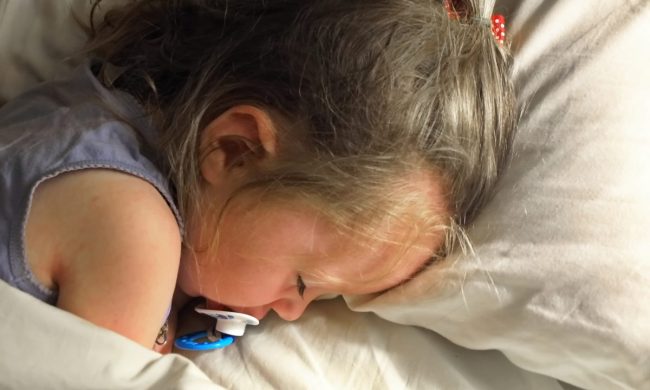Teenagers are famous for being tough to rise in the morning, and there’s a reason for that. They’re often tired because they didn’t get enough sleep, but there are ways to help them get more. With teenagers being at risk for sleep deprivation, it’s important to do what you can to combat it because sufficient sleep is essential for healthy development. If you are wondering whether or not your teen is getting enough sleep, you might be surprised.

How much sleep do teenagers need?
The American Academy of Sleep Medicine recommends that teenagers ages 13–18 should sleep 8–10 hours per 24 hours.
If your teen needs to get up at 6:00 AM for school, they would need to fall asleep by 10:00 PM at the latest. That’s being asleep, not going to bed, at 10:00. You can use this bedtime calculator to help figure out a bedtime for your teen that gets them to bed with enough time to fall asleep for at least eight hours.
How much sleep do teenagers get?
When the CDC analyzed data from the 2015 national and state Youth Risk Behavior Surveys, they saw they about 72.7% of teenagers reported getting less than eight hours of sleep per night on school nights. If your teen is like those seven in ten, they need more sleep on school nights.
According to sleep expert Dr. Laura Sterni, “Teens experience a natural shift in circadian rhythm” that makes it harder for them to fall asleep before 11:00 PM. This circadian rhythm reset occurs at the onset of the teen years and makes teens want to fall asleep later and wake up later. With early school start times, it’s often very hard to go with what feels natural because the later wake-up time isn’t possible.
Despite this shift, it’s still very important to do all you can to help support them in getting to bed earlier if they need to get up early.
Why is sleep important for teenagers?
Teenagers’ brains aren’t fully developed, so they need sleep for their growing brain and body. As they go through growth spurts and cognitive development, they need to have enough sleep to fuel that growth.
A feeling of chronic exhaustion can interfere with every element of physical and mental health. Not getting enough sleep puts teens at higher risk of “obesity, diabetes, injuries, poor mental health, and problems with attention and behavior,” according to the CDC.

How can I get my teenager to sleep?
Even if it feels like all your teen does is sleep, they may be trying to make up for those missed hours on weeknights with the early start time for school. Let them sleep in when they can and let them take naps when they want. Don’t nag them about lounging around as long as they get enough fresh air and exercise, too.
If you notice your teen is zoning out on screen time a lot, suggest they take a nap instead of spending tired time awake on their phone. Getting restful sleep instead of starting at a video game will be much more restorative. A nap of just 30 to 45 minutes before dinner can make a big difference.
Any exposure to sunlight through the day can help, too, to help set their circadian rhythm to the day’s natural cycle. Think about serving breakfast outside, if you can, or at least by a window.
Putting down the phone before bedtime is also an important element of good sleep hygiene. The light from a phone disrupts natural rhythms and can be addicting to stay up later than is healthy. You can make a rule like no phone in the bedroom, no phone in bed overnight, or no phone after one hour before bedtime. A “media curfew” that starts reading time will help your teen fall asleep.
They may have outgrown bedtime stories and the same routine they had when they were toddlers, but teens still benefit from a consistent nighttime routine and a consistent bedtime. Going to bed at the same time every night helps sleep hygiene. Making sure they get their homework done before dinner or at a decent hour can also help with the nightly routine so that they have some time to wind down after they’re done.
If nothing else is working and you’re concerned about your teen’s fatigue, schedule a pediatrician check-up. If they are dealing with insomnia, sleep apnea, or another sleep disorder, medication or other treatment will be needed to help their sleep.



